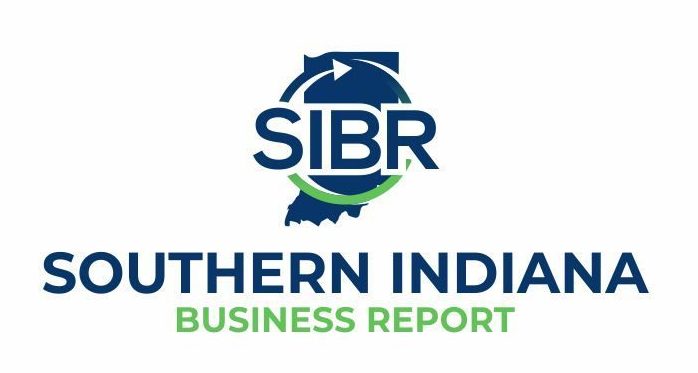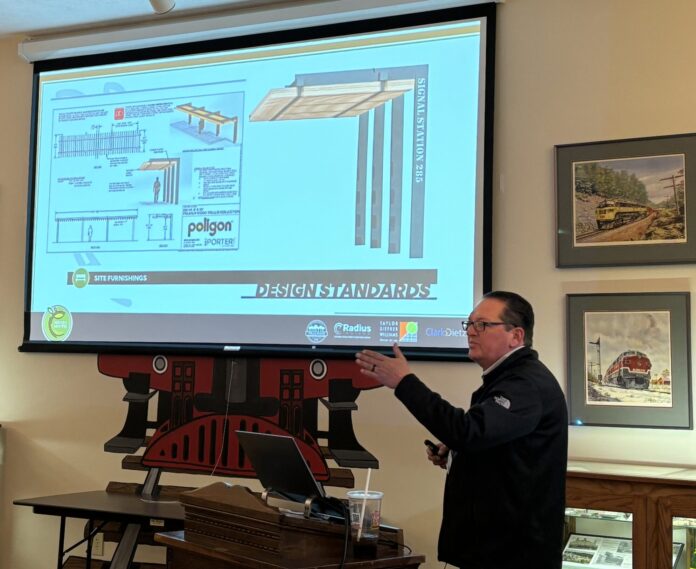Carol Johnson, Southern Indiana Business Report
SALEM – Southern Indiana officials got a sneak peek of the trailhead features, rest areas and construction timeline of the Monon South Trail Tuesday during a meeting at the Depot Railroad Museum in Salem.
Ron Taylor from Taylor Siefker Williams, a landscape architect firm; Ryan Hughes, engineer and program manager from Clark Dietz, Inc. and Jeff Quyle, CEO and president of Radius Indiana, presented an update of the design and next steps for portions of the 62-mile trail that will be constructed in Clark, Washington, Orange and Lawrence counties.
Hughes said the engineering and design team has held to an aggressive schedule to be able to begin construction, tentatively scheduled for June. In March, 90% of the design plans will be submitted for review and bid-letting could begin in April. A pre-bid construction conference was held in December to give contractors an overview of the project.
The trail will be completed in three phases. Phase 1 will begin in Borden and concentrate on the six trailheads located in Borden, New Pekin, Salem, Campbellsburg, Orleans and Mitchell. The trailheads will include restrooms and water fountains, covered shelter space, benches and parking.
The trail surface will be a mix of paved trail and crushed limestone. Hughes said Phase 1 will have nine miles of paved trail and 11.5 miles of aggregate. The trail will meet current ADA requirements.
Hughes noted there are 11 bridges along the trail, all will receive new decking and handrails.
Gov. Eric Holcomb allocated nearly $25 million for trail construction from Indiana’s Next Level Trails program. The total cost for all 62 miles will cost in the neighborhood of between $60 million and $70 million, Quyle said.
Radius will apply for grant funds from the US Department of Transportation to secure the remaining costs. The USDOT grants could bring in about $30 million and the state’s READI program is another potential source.
The removal of rails created an opportunity to regrade several street crossings. Quyle told the group that Radius Indiana has paid for $77,000 of the $329,000 in improvements to street crossings that were completed after the rails were removed. The Radius funds improved the grading of the street crossings to improve local vehicular traffic flow.
Radius has also worked with the communities along the Monon South to update their park master plans. The communities are working with the Eppley Institute for Parks and Public Lands at Indiana University.
Quyle said Radius Indiana is working with the Office of Community and Rural Affairs to launch a new regional Main Street program that will link the communities along the trail and bolster local businesses as they receive new trail visitors and tourists.
Designing a trail that is accessible to all and provides an experience that makes visitors want to come back were among the guiding principles of the trail design, Taylor said. Also top of mind was telling the history of the railroad, its impact on communities and the land.
Wood and black metal will be the primary materials used for trail structures such as restrooms, benches, waste receptacles and mile markers. Any remaining railroad infrastructure along the trail will be used for an interpretive experience.
In addition to the trailheads, there will be small covered rest areas about every 4 miles on the trail.
John and Renee Linthicum of Mitchell were among those attending the meeting.
“This meeting gave us a lot more information on the aesthetics of it and what it’s going to look like,” Renee said. “This is something that the townspeople can actually see. They’ll recognize their town, they will recognize their trail head.”
Overall, Renee said she was impressed with the design and features that are planned.
“I think they’re doing a great job. It’s a long trail and there’s a lot to do but I feel like we’re on the right track,” she said.



